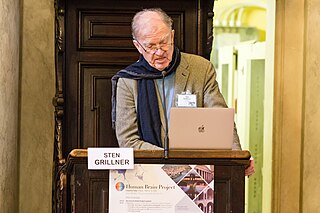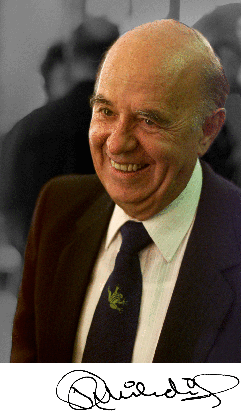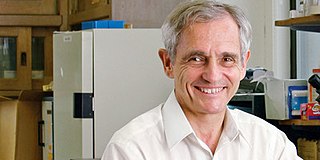Related Research Articles

Neuroscience is the scientific study of the nervous system, its functions and disorders. It is a multidisciplinary science that combines physiology, anatomy, molecular biology, developmental biology, cytology, psychology, physics, computer science, chemistry, medicine, statistics, and mathematical modeling to understand the fundamental and emergent properties of neurons, glia and neural circuits. The understanding of the biological basis of learning, memory, behavior, perception, and consciousness has been described by Eric Kandel as the "epic challenge" of the biological sciences.
The Society for Neuroscience (SfN) is a professional society, headquartered in Washington, D.C., for basic scientists and physicians around the world whose research is focused on the study of the brain and nervous system. It is especially well known for its annual meeting, consistently one of the largest scientific conferences in the world.
The Richard Lounsbery Award is given to American and French scientists, 45 years or younger, in recognition of "extraordinary scientific achievement in biology and medicine."

Cornelia Isabella "Cori" Bargmann is an American neurobiologist. She is known for her work on the genetic and neural circuit mechanisms of behavior using C. elegans, particularly the mechanisms of olfaction in the worm. She has been elected to the National Academy of Sciences and had been a Howard Hughes Medical Institute investigator at UCSF and then Rockefeller University from 1995 to 2016. She was the Head of Science at the Chan Zuckerberg Initiative from 2016 to 2022. In 2012 she was awarded the $1 million Kavli Prize, and in 2013 the $3 million Breakthrough Prize in Life Sciences.

Sten Grillner is a Swedish neurophysiologist and distinguished professor at the Karolinska Institute's Nobel Institute for Neurophysiology in Stockholm where he is the director of that institute. He is considered one of the world's foremost experts in the cellular bases of motor behaviour. His research is focused on understanding the cellular bases of motor behaviour; in particular, he has shown how neuronal circuits in the spine help control rhythmic movements, such as those needed for locomotion. He is the current secretary general of the International Brain Research Organization (IBRO) and president of the Federation of European Neuroscience Societies (FENS). For his work, in 2008 he was awarded the $1 million Kavli Prize for deciphering the basic mechanisms which govern the development and functioning of the networks of cells in the brain and spinal cord. This prize distinguish the recipient from the Nobel prizes in basic medical sciences.

Ricardo Miledi was a Mexican neuroscientist known for his work deciphering the role of calcium in neurotransmitter release. He also helped to develop a technique for studying native receptors in frog oocytes for drug development.
Richard Lewis Huganir is a Bloomberg Distinguished Professor in the Departments of Neuroscience and Psychological and Brain Sciences, Director of the Solomon H. Snyder Department of Neuroscience, and co-director of the Johns Hopkins Medicine Brain Science Institute at the Johns Hopkins University School of Medicine. He has joint appointments in the Department of Biological Chemistry and the Department of Pharmacology and Molecular Sciences in the Johns Hopkins School of Medicine.

Eleanor Anne Maguire is an Irish neuroscientist. Since 2007, she has been Professor of Cognitive Neuroscience at University College London where she is also a Wellcome Trust Principal Research Fellow.
The Karl Spencer Lashley Award is awarded by The American Philosophical Society as a recognition of research on the integrative neuroscience of behavior. The award was established in 1957 by a gift from Dr. Karl Spencer Lashley.
The Perl-UNC Prize is awarded internationally in the field of neuroscience. Its purpose is two-fold: to recognize researchers for outstanding discoveries and seminal insights in neuroscience and to celebrate the strength of the neuroscience research program at the University of North Carolina at Chapel Hill.
Patrik Verstreken is a Belgian neuroscientist, highly cited in his field. His work is focused on the function of neuronal synapses during health and neurological disease. Major contributions include identifying molecular mechanisms by which neurodegenerative diseases such as Alzheimer's disease spread throughout the brain and identification of new defects causing Parkinson's disease.

Donald Wells Pfaff is a professor and head of the Laboratory of Neuroscience and Behavior at The Rockefeller University in New York City.

Sergiu P. Pașca is a Romanian-American scientist and physician at Stanford University in California. He is known for creating and developing stem cell-based models of the human brain and applying organoids and assembloids to gain insights into neuropsychiatric disease.
Rosemary C. Bagot is a Canadian neuroscientist who researches the mechanisms of altered brain function in depression. She is an assistant professor in behavioral neuroscience in the Department of Psychology at McGill University in Montreal, Canada. Her focus in behavioral neuroscience is on understanding the mechanisms of altered brain circuit function in depression. Employing a multidisciplinary approach, Bagot investigates why only some people who experience stress become depressed.
HollisT. Cline is an American neuroscientist and the Director of the Dorris Neuroscience Center at the Scripps Research Institute in California. Her research focuses on the impact of sensory experience on brain development and plasticity.
Tim P. Vogels is a professor of theoretical neuroscience and research leader at the Institute of Science and Technology Austria. He is primarily known for his scholarly contributions to the study of neuronal plasticity related to learning and memory in the brain.
Camilla Bellone is an Italian neuroscientist and assistant professor in the Department of Basic Neuroscience at the University of Geneva, in Switzerland. Bellone's laboratory explores the molecular mechanisms and neural circuits underlying social behavior and probes how defects at the molecular and circuit level give rise to psychiatric disease states such as Autism Spectrum Disorders.

Hu Hailan is a Chinese neuroscientist, professor, and executive director of the Center for Neuroscience at Zhejiang University School of Medicine in Hangzhou, China. Hu explores neural mechanisms underlying social behaviors and psychiatric diseases. She specifically explores the neural substrates of social rank and the role of neuron-glia interactions in driving depressive behaviors. Hu discovered the anatomical and molecular targets of ketamine's fast-acting antidepressant effects to be localized to the lateral habenular circuits in rodents. Hu was also the first scientist outside of Europe and America to be awarded the IBRO-Kemali Prize in over 20 years. She is also a member of the Jiusan Society.
Casper Hoogenraad is a Dutch Cell Biologist who specializes in molecular neuroscience. The focus of his research is the basic molecular and cellular mechanisms that regulate the development and function of the brain. As of January 2020, he serves as Vice President of Neuroscience at Genentech Research and Early Development.

Pierre J. Magistretti is an Italian and Swiss neuroscientist and physician. He is a professor emeritus of neuroscience at EPFL, University of Geneva and University of Lausanne. Until 2012, he was the director of the EPFL's Brain Mind Institute and director of the Center for Psychiatric Neuroscience of the University of Lausanne and Lausanne University Hospital. Since 2012 he has been distinguished professor at King Abdullah University of Science and Technology where he was dean of the division of biological and environmental sciences and engineering between 2012 and 2020.
References
- 1 2 "IBRO-Kemali Foundation Prize". IBRO. Retrieved 2020-08-18.
- 1 2 "First Asian Scientist to be awarded the IBRO-Kemali Prize: Dr Hu Hailan". www.asiabiotech.com. Retrieved 2020-08-18.
- 1 2 "The IBRO Kemali International Prize". www.sins.it. 2017-04-18. Retrieved 2020-08-18.
- ↑ "IBRO-Kemali Prize Awarded to Dr. Sergiu P. Pasca". 2021-09-20. Retrieved 2024-05-29.
- ↑ 刘明. "Nueroscientist awarded IBRO-Kemali research prize - Chinadaily.com.cn". www.chinadaily.com.cn. Retrieved 2020-08-18.
- ↑ Office, FENS. "Dr. Guillermina López-Bendito awarded with The 11th IBRO Kemali International Prize for Outstanding Contributions in Neuroscienc". FENS.org. Retrieved 2020-08-18.
- ↑ "IBRO-Kemali prize for Casper Hoogenraad - UMC Utrecht". www.umcutrecht.nl. Retrieved 2020-08-18.
- ↑ "Patrik Verstreken to be Awarded 2014 IBRO-Kemali Prize for Research in the Field of Basic and Clinical Neurosciences". PR.com. Retrieved 2020-08-18.
- ↑ "IBRO Kemali Prize Winners". IBRO. Retrieved 2020-08-18.
- ↑ "The 11th IBRO Kemali International Prize for Outstanding Contributions in Neuroscience". www.fens.org. Retrieved 2020-08-18.
- ↑ "IBRO-Kemali Prize Nominations". IBRO. Retrieved 2020-08-18.
- ↑ "UC Irvine - Faculty Profile System". www.faculty.uci.edu. Retrieved 2020-08-18.